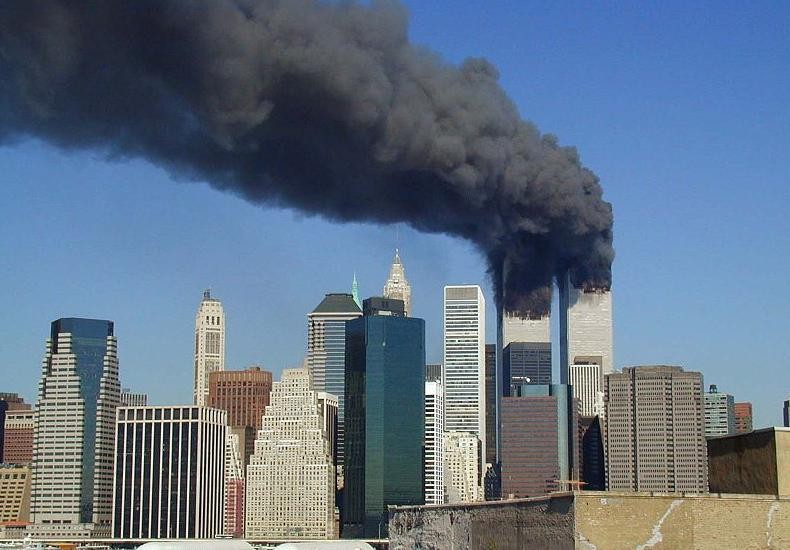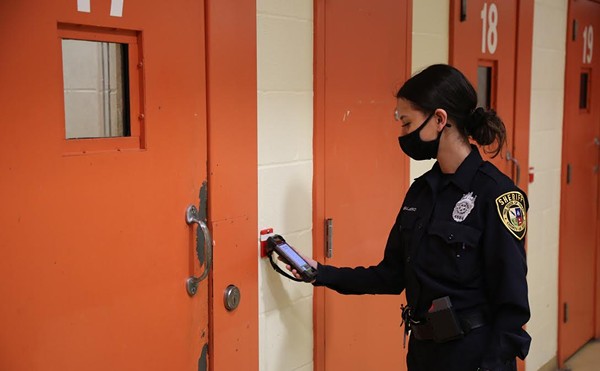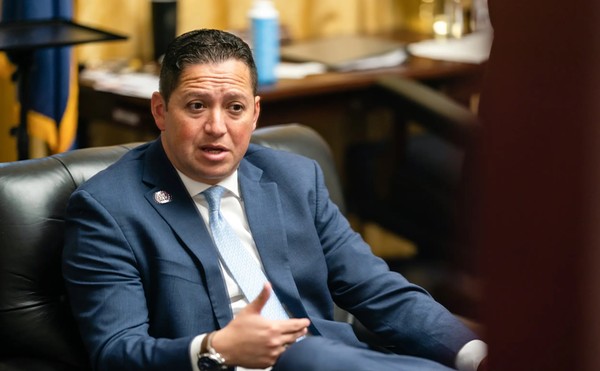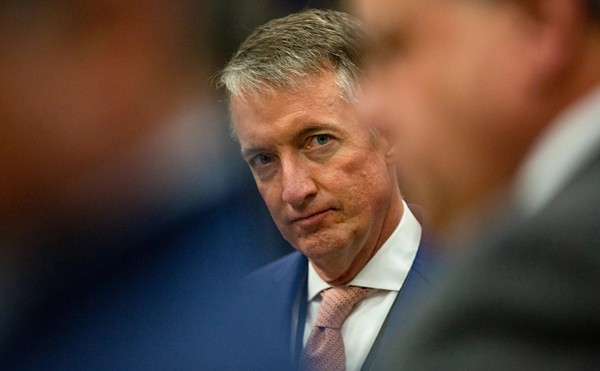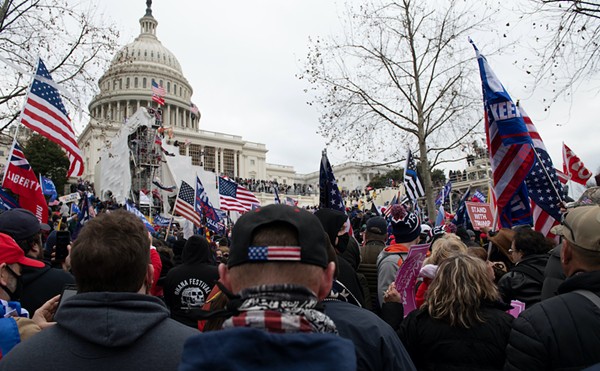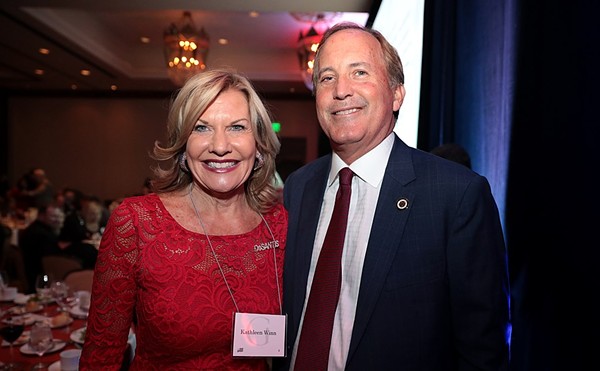The attacks of September 11 brought me back to the world. I had a year earlier retreated to a high desert outpost to run a startup weekly paper — ditching what felt like a natural progression from West Texas to Las Vegas with the goal of landing at some unknown major metro on one of the coasts. Just after George W. Bush was elected president, oil interests were now firmly in charge. I was despondent, and yet ultimately clueless as to what the full ramifications of that election would be.
When the airliners started coming down, I was living in Alpine, firmly in retreat mode. As a former reporter at the Odessa American I'd seen what Bush meant for the environment after the city's largest employer, Huntsman Chemicals, entered an “upset period” during an expansion process. Two weeks of foul, toxic air hovered over the town. I came to know what the African-American community there — who hosted what at one time was known as the nation's largest inland refinery complex — knew as the Odessa Syndrome: body aches, chills, coughing, bloody noses. The Odessa story would eventually be picked up by Gail Sheehy for Vanity Fair, but the failure of state regulators to protect people in this roustabout town didn't slow Bush's ascent. After he was elected I was pretty sure I didn't want to see what would happen next.
The morning of September 11, 2001, I was in the newspaper office, getting ready for another week. The advertising director called me to the back as her radio relayed the drama of airplanes become missiles, New York under attack. It took what felt like several minutes to understand that what I was hearing wasn't a radio drama like Orson Welles' infamous War of the Worlds broadcast. Weeks later, as our town's few part-time Texans began returning from the Big Apple to their seasonal haunt, stories about scrambling beneath parked vehicles and other near-misses became personal for us.
As someone who had already done a share of reading about the Middle East and U.S. covert and overt foreign actions, I didn't need to ask why we may be hated (or loved, for that matter) by any number of people around the world. Ours has not been a faultless reign among world powers. But in the weeks that followed it seemed like all the world was shocked awake. America's anger, confusion, fear, and grief were shared the world over, displayed in repeated candle-lit vigils in international city centers. The Muslim world mourned. The Jewish world mourned. The secular and religious states mourned. And for a moment, the world lived in revulsion: not over any fault or injustice would-be terrorists could use to rally for their cause but for the ugliness that terror itself represented. For a moment we held the world's sympathy. Then we allowed Bush and Cheney to implement plans of an inhuman playbook that had been charted out well in advance of 9/11. War went ahead as scheduled.
Despite the heroic service of so many of our veterans, we seem to have made just about every mistake imaginable. The biggest manipulated “goof” being the attack of the intensely secular state of Iraq in the name of dismantling the frothingly religious Al Qaeda. Of course, we went to Iraq also to seize promised weapons of mass destruction. If ever there was a wasted trip in terms of lives and capital, this was it. Of course, the so-called War on Terror has also taken us into Afghanistan, Pakistan, Yemen, Somalia, and beyond, but it's been the occupation of Iraq that has provided Al Qaeda it's greatest recruiting tool and training ground. If this was about making America safe, Iraq was a bust.
In “9/11 blind,” a column carried by many of the country's alt-weeklies this week, Tom Hayden breaks down the so-called War on Terror by the numbers.
A combined 6,197 Americans were killed in these wars in the name of avenging 9/11 — a day when 2,996 Americans died. The total Americans wounded has been 45,338, and rising at a rapid rate. The total number rushed by Medivac out of these violent zones was 56,432. That’s a total of 107,967 Americans. And the active-duty military-suicide rate for the decade is at a record high of 2,276, not counting veterans or those who have tried unsuccessfully to take their own lives. In fact, the suicide rate for last year was greater than the American death toll in either Iraq or Afghanistan.
If Osama bin Laden succeeded in anything worse than those terror attacks of a decade ago, it was luring us into conventional warfare abroad. Combined, we've spent $1.2 trillion, and the global war will come to cost — after we factor in long-term care for our veterans — between $4-$6 trillion, on the conservative side, according to a pair of leading economists quoted by Hayden.
All week long, leading up to this bloody anniversary, stories have been running about the massive amount of treasure diverted to Homeland Security. The price of the border wall. The draining of weather-related emergency-response funds. True, we haven't had another 9/11, but at what cost, I wonder. It will be a long time before the security state that's grown up to replace much of our government — including those formidable private armies established to circumvent Republican interests in limited government — is dismantled. And yet real security is far from attained.
A remarkable book released recently demonstrates the ocean of difference that continues to separate the New Yorkers who lived through 9/11 personally and the feds hell-bent on preventing a similar attack elsewhere in the country. In I Heard the Sirens Scream, Laurie Garrett writes:
The NYPD, in contrast to the federal authorities, took a non-combative, intelligence-gathering approach to the threat of terrorism, building up a team of 600 linguists drawn from New York’s immigrant populations, that gave Gotham greater depth of understanding of plans hatched in Urdu or Pashtun than the FBI or CIA could boast. Moreover, New York became a more harmonious place, with about 30 percent of its population foreignborn, nearly every language on earth spoken within its boundaries, and native-born populations of all races and religious tendencies. Far from representing a dire threat for poor and minority populations of the city, Bloomberg created a social climate of civility and fairness in the overall crime rate fell to levels not seen since the 1950s and racial tensions greatly diminished. Until the Crash of September 18, 2008, Gotham boomed.
It's fascinating reading, particularly when considered in tandem with the passel of feature stories in the most recent Mother Jones demonstrating how many of the frustrated terror attacks you may have read about were essentially plots generated by the CIA and FBI. Or when considering the racial tempest being stirred up today by right wingers on the immigration front as an outgrowth of our 9/11 jitters. All of it makes one question where the real threat lies. Who has injured our country more, Osama or our response to him?
One of the more remarkable stories I heard while living on the border (Alpine is still an hour north of the Rio Grande, but we considered ourselves deep in la frontera) was told to me by a former lover of Ojinaga, Mexico, drug lord Pablo Acosta. Back in the '80s the U.S. intelligence community was hunting Libyans (much like those chasing potential 9/11 anniversary bombers today, there was "credible information" in play), and the woman relayed the concerns of her other lover (who happened to be an FBI agent U.S. Customs agent*, making for a killer of a love triangle chronicled in the book Drug Lord) to Acosta.
He was anxious to know more. Even this crack-addicted drug runner who pushed huge amounts of heroin into the U.S. was concerned. (“This is our home, too,” he responded.)
Then the humorous part of the story begins.
“Well, what does a Libyan look like?” he asked.
“Well they have dark hair,” Mimi Webb Miller, border resident and niece of the late U.S. Senator John Tower, told me she replied.
“Yeah?”
“They wear mustaches...”
“Uh huh.”
“And have sort of big noses.”
Of course, she was also describing Acosta perfectly. But my takeaway was always that it is friendships, information, communication, common interests that stop terror. Not checkpoints. Not walls. Not a ramping up of the daily harassment that has occurred in so many border towns. Certainly not the forced divorce of extended families who have long shared the river, traded goods, weathering good times and bad.
Early next year, the traditional river crossing inside Big Bend National Park to the small town of Boquillas is expected to reopen. The many similar crossings all across this territory that has been joining families for hundreds of years will remain closed. If the Terror War has been a key ingredient in our economic miasma, here is another smaller way that we are also impoverished by our response to 9/11 , yet repeated hundreds of times across our southern boundary. — Greg Harman
---
* Webb Miller, taking issue with some of Drug Lord's narrative, said the Customs (not FBI) agent was a former lover at the time of this conversation with Acosta. Corrected 11 a.m., 9/12/11.

